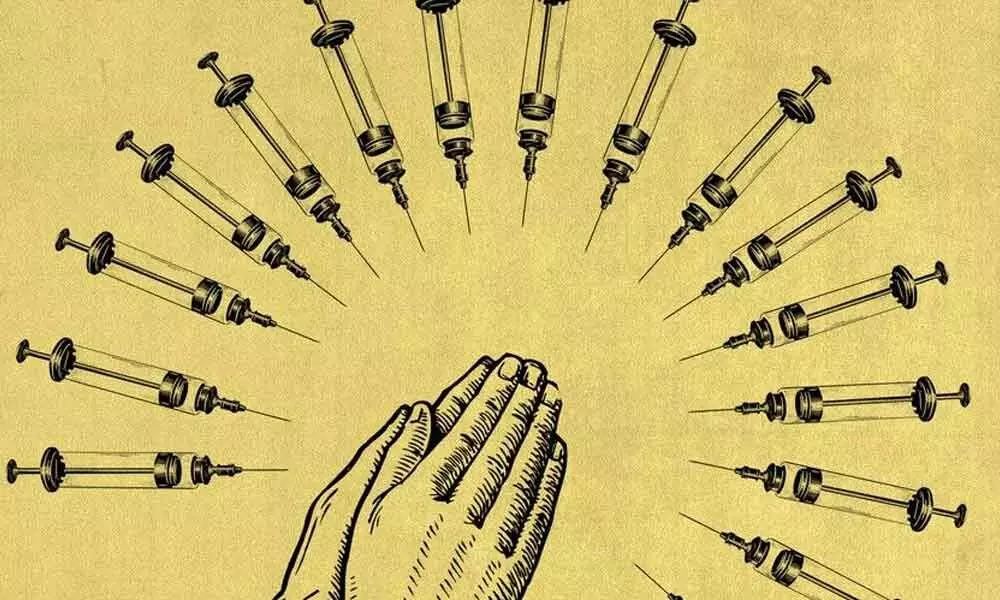Live
- Black Friday 2024: Top Gadget Deals You Can’t Miss – iPhone 16 for Rs 72,900 and More
- Some politicians attempting to divide Hindus for votebank: Former UP Minister
- Bangladesh's Deposed PM Sheikh Hasina Condemns Arrest of Hindu Leader Chinmoy Krishna Das, Demands Immediate Release
- Telangana DGE Revises SSC Exam Fee Payment Schedule for 2025
- ESA Proba-3 Mission Launch on ISRO's PSLV-XL Rocket: December 4, 2024
- MP Priyanka’s debut: Posts featuring Rahul, Kharge win hearts on social media
- 2025 Bollywood Movie Release Dates: Shahid Kapoor’s Deva in January to Alia Bhatt’s Alpha in December
- Shivraj Chouhan tells officials to ensure farmers get high quality fertilisers, seeds and pesticides
- Preamble of Constitution describes India’s collective spirit: Gopalkrishna Gandhi at Constitution Day lecture at JGU
- Centre to offload 25 lakh tonnes of wheat in open market to bring down price
Just In

Vaccine crime threat and Covid-19 pandemic
The expectation of the development of a viable Covid-19 vaccine has generated global attention
The expectation of the development of a viable Covid-19 vaccine has generated global attention. The anticipated arrival of a genuine Covid-19 vaccine has already inspired criminal activities and will likely be exacerbated once vaccines become available.
Trafficking of pharmaceutical products takes place on a large scale and is highly lucrative for the organised crime groups involved. Organised crime has reacted swiftly to adapt its methods and product offerings to the Covid-19 pandemic.
What is happening?
The World Health Organization detected a falsified influenza vaccine in Mexico in October 2020. The fake vaccine had a different batch number and expiry dates than genuine products. The alleged manufacturing pharmaceutical company confirmed that they did not produce or distribute this product.
Fake vaccine
The detection of a fake influenza vaccine confirms that criminals seize opportunities as soon as they present themselves. Owing to the pandemic, the demand for the influenza vaccine has been higher than usual and their risks being a shortage. Criminals have reacted quickly by producing counterfeit influenza vaccines.
The same scenario is also likely to happen when Covid-19 vaccines do become available. Criminals may attempt to exploit the current global focus on Covid-19 vaccines. Criminals may spread disinformation about vaccines to defraud individuals and companies. When a Covid-19 vaccine does become available, it will likely not be available for sale online. However, fraudulent pharmaceutical products advertised as allegedly treating or preventing Covid-19 are already on sale, both offline and online.
Phony brands
Some dark web markets feature advertisements for fake Covid-19 vaccines. The number of offers is limited at this stage but will likely increase once a legitimate vaccine becomes available. Criminals advertise their fake vaccines using the brands of genuine pharmaceutical companies that are already in the final stages of testing.
Once a legitimate vaccine enters the market, counterfeited versions of the specific vaccine brand are expected to circulate rapidly. Fake vaccines may even have a wider-reaching impact if new outbreaks emerge in communities assumed to be vaccinated. Counterfeit vaccines may circulate on illicit markets or be introduced to the legal market, as occurs regularly with other counterfeit pharmaceuticals.
The expected high demand for Covid-19 vaccines will likely attract organized crime groups seeking to capitalize on the pandemic situation and subsequent vaccination campaigns. For example, criminals may resort to illegally refilling empty vials. Therefore, procedures for the correct disposal of vials by grinding or incineration will have to be properly enforced.
Vulnerable supply chains
When demand exceeds supply, criminals seek to divert pharmaceutical products from the legal market due to the substantial profits on offer. High demand may prompt some people to seek out alternative sources of the vaccine rather than official government-sanctioned vaccination program.
Genuine Covid-19 vaccines will be highly valuable commodities and their supply chains (storage, transportation and delivery) will be at risk of being targeted by criminals seeking to obtain these pharmaceutical products. Organised crime groups might target transit containing Covid-19 vaccines for hijacking and theft.
Transport associations are preparing for the large-scale logistical effort of transporting and distributing the vaccines taking into consideration security risks. Diversion from the legal market may also pose risks to public health, as vaccines found outside the cold chain are not considered safe.
Mushrooming websites
Throughout the Covid-19 pandemic, cyber threat actors have capitalised on global interest surrounding the virus to target users. Early in 2020, thousands of website domains related to Covid-19 were registered, and many of these websites were subsequently used to host malware and for other fraudulent activity.
Phishing emails using Covid-19 lures have also been sent to users in an attempt to convince the recipient to divulge sensitive or financial information, or open malicious links or attachments. These same tactics continue to be employed, now with Covid-19 vaccine themes and lures. Covid-19 vaccine-themed phishing emails may include subject lines that make reference to vaccine registration, information about vaccine coverage, locations to receive the vaccine, ways to reserve a vaccine, and vaccine requirements. Links and attachments included in various phishing campaigns may employ brand spoofing and impersonate well-known and trusted entities, such as government agencies, healthcare providers, or pharmaceutical companies.
Thus, misinformation and disinformation regarding Covid-19 vaccines are already circulating, particularly on social media platforms, and will likely continue for the foreseeable future. It is imperative to only seek out vaccine information from official sources, such as the centres for disease control and prevention, World Health Organisation, or your healthcare provider.
(The author is a security researcher)

© 2024 Hyderabad Media House Limited/The Hans India. All rights reserved. Powered by hocalwire.com







